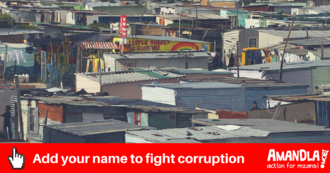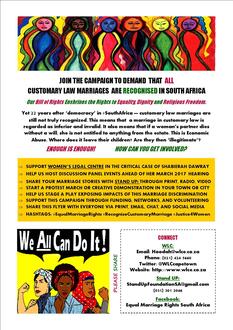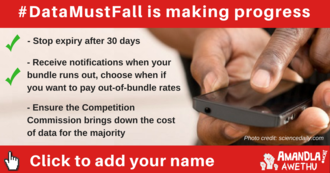- Featured
- Clean air
- Climate justice
- Consumer Rights
- Corporate Accountability
- Data access
- Early Childhood Development
- Economic fairness
- Education
- Electoral fairness
- Environmental justice
- Food justice
- Gender based violence
- Grants/social assistance
- Health
- Housing and infrastructure
- Industry interference
- Land Justice
- LGBTQIA+ rights
- Media/ information access
- Public transport
- Racism
- Reparations
- Safety
- Sanitation
- Service Delivery
- Sexual and Reproductive Rights
- Social justice
- Unemployment
- Womxn's rights/ gender equality
- Workers' rights
- More
-
Fight corruption, demand transparent service delivery in AbaQulusi MunicipalityWe can improve service delivery and fight corruption in our Municipality by ensuring all Service Delivery Agreements (SDAs) are public and easily accessible to all. Some politicians, officials and businesses are scared about transparency, but if they aren't doing anything wrong, what have they got to hide.2 of 100 SignaturesCreated by Phumlani Mangethe
-
Fight corruption, demand transparent service delivery in Emalahleni Local MunicipalityWe can improve service delivery and fight corruption in our Municipality by ensuring all Service Delivery Agreements (SDAs) are public and easily accessible to all. Some politicians, officials and businesses are scared about transparency, but if they aren't doing anything wrong, what have they got to hide.29 of 100 SignaturesCreated by Chris Van Rooyen
-
Fight corruption, demand transparent service delivery in Mogale City Local MunicipalityWe can improve service delivery and fight corruption in our Municipality by ensuring all Service Delivery Agreements (SDAs) are public and easily accessible to all. Some politicians, officials and businesses are scared about transparency, but if they aren't doing anything wrong, what have they got to hide.5 of 100 SignaturesCreated by Alan Exton
-
STOP TAXING OUR PERIODHave you ever wondered about the impact of a woman's period on society? For many women around the globe and in particular our home country South Africa, this is a daily challenge, especially when trying to have access to affordable sanitary wear. At present the majority of women around the world are currently on a menstrual period and there are millions of women who do not have access to this basic necessity, especially our school-going young women, who can ill-afford to miss school during their developing years. Those who can afford sanitary wear, are then subjected to paying tax on acquiring a basic necessity to feel clean and comfortable, during a period. With the escalating price of sanitary towels it would be most welcoming if our government can drop the tax on this very important commodity. In order to grow a self-sustainable country we need to ensure that we create a strong foundation and that is investing in our future generation. The women of our country serve the backbone of our economy and if we cannot ensure their well-being then the cycle of poverty is perpetuated. Please SIGN THE PETITION TO STOP TAXING OUR PERIOD91 of 100 SignaturesCreated by Cecilé-Ann Pearce

-
#FeesMustFall National ImbizoOur children have missed the academic year because of the hide and seek the government officials do, the ruling party had promised that we would have Free Quality Education in South Africa to close the gap between the previous disadvantage and the advantage group.112 of 200 SignaturesCreated by Monwabisi Maswana
-
Respect Customary Marriages In South AfricaMEDIA RELEASE: New date agreed by the parties in the recognition of Muslim marriages class action Today, Monday 20 March 2017, the before Human Rights Day, a new date was agreed by the parties concerned for the recognition of Muslim marriages class action to heard by the High Court. The 28th August has been agreed. A directions hearing was convened by the High Court this morning after the Judge President ordered the consolidation of a further matter pending before the High Court which similarly highlights the plight of Muslim women. There are several matters that are pending at a number of courts across the country. This is testament to the fact that Muslim women are struggling to assert their rights because their Muslim marriages and the consequences arising therefrom are not legally recognised. They have no option but to plead their cases with the courts and the judiciary. Given the importance of the matter three judges have now been appointed to hear the matter. Namely; Judges S Desai, G Salie-Hlophe and NP Boqwana. This morning saw women come to the steps of the High Court from all over Cape Town to show solidarity and support for this matter. The lived reality of these women is that legal protection has been denied to them some 16 years after the Constitution came into force. This results in widespread oppression and gender discrimination in areas such as divorce, the duties of support, parental rights and responsibilities and inheritance. Press Release On Other Case Outcomes: http://www.wlce.co.za/images/press%20releases/WLC_Customary%20Marriages%20Act_Limpop%20ruling_020816%20press%20release.pdf Article: Are nikah and sindoor equal to wedding rings and lobola?: http://www.standup.co.za/bambanani-social-justice/resources/63-wlc-customary-marriages-case.html Also Read: http://www.polity.org.za/article/official-customary-law-and-the-disruption-of-patriarchal-power-the-case-of-msinga-2013-09-2631 of 100 SignaturesCreated by Stand UP! Foundation

-
Sign the campaign #DataMustFallResearchers who took into account cost of living, have found that South Africa has the second most expensive data costs among BRICS countries [1]. Previously as reported by IOL, many have claimed that Mzansi’s data costs are the highest in the world: 1GB (gigabyte) of data costs R150 in Mzansi, compared to R11 in India, R22 in Nigeria and R23 in Namibia [2]. However, this comparison is not adjusted for cost of living, so in order to compare apples with apples. Indra de Lanerolle, an expert whose research concerns Internet access, use and development and the Internet's social, political and economic effects, in South Africa and the continent, agrees with the call for a 50% cut on data costs when he asserts, "On three major networks (which account for more than 95% of all mobile customers) 500MB – the amount of data they set as a minimum – of data costs between R85 and R105. So for the average South African 500MB per month is unaffordable. In fact mobile data prices would have to fall by about half to be affordable." [3] The digital divide excludes the majority of people in South Africa from accessing information and news, applying for jobs, accessing education resources online and keeping in touch with family and friends. High data costs perpetuate inequality. The internet must be democratised now! The nature of South Africa’s economy forces many to leave their loved ones to find work in urban areas, but lowering the cost of data will allow people to call, share pictures and videos with loved ones back home. Without access to data, most of us as the members of amandla. mobi would not even be able connect and fight for social justice, let alone know what is going on in our country given the SABC censoring news lately. [1] http://www.fin24.com/Tech/Multimedia/data-prices-how-sa-compares-to-the-rest-of-the-world-20160930 [2] http://www.iol.co.za/news/politics/datamustfall-cut-costs-or-else-icasa-warns-2072293 [3] https://theconversation.com/internet-freedom-why-access-is-becoming-a-human-right-5912557,874 of 75,000 SignaturesCreated by amandla mobi member

-
Early childhood developmentChildren from age 1 to 6 got a very innovative education and my intake of children in 1 year is the proof that We provided a holistic education .173 of 200 SignaturesCreated by Nisha Singh
-
Stop riging Kagera donors condolencesThis goverment has been rigging it own funds/budget in the name of recostruction of the corrupt system but corruption is even growing in alarming speed and has been musterminded by the state itself.1 of 100 SignaturesCreated by Antisedition Tanzania
.png)






